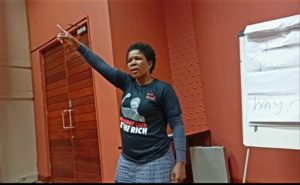“Women’s issues are inherently political”- Ngazini Ngidi
This year marks 27 years of democracy, 9 August marks 65 years since the historic Women’s March against pass laws. Statistics South Africa in September 2020, reported that about 6.5 million South Africans are unemployed, and women make up about 46.8% of that proportion.
Efforts from the democratic government during the transition in 1994 provided a critical juncture for ensuring that the priorities of South Africa included gender equality and equitable representation of women. While this was largely achieved in formal institutional and legal terms, the state of feminist activism and radical transformational politics continues to battle from the historical remnants of the harsh regime and its social and economic impact.
ensuring that the priorities of South Africa included gender equality and equitable representation of women. While this was largely achieved in formal institutional and legal terms, the state of feminist activism and radical transformational politics continues to battle from the historical remnants of the harsh regime and its social and economic impact.
The adverse effects resulting from apartheid spatial planning remains a reality, decades after the demise of the apartheid regime. South Africa is now more than 66% urbanised and the urban population is projected to grow to more than 70% by 2030. Access to land and adequate housing is a pivotal resource that provides economic opportunity and human settlements in the forms of housing and sustenance.
In a paper titled: Stepchild of National Liberation: Women and Rights in the New South Africa, Penelope Andrews, professor of law and academic writer on gender equality, analyses the struggle for women’s rights in post-apartheid South Africa. She traces the origins of women’s struggle in urban and rural areas, to a major legacy of apartheid, influx control.
Migrant labour in South Africa was based on apartheid ideologies enforced through the Native Labour Act of 1911 and the Natives Land Act of 1913. These laws ensured that Black people were temporary sojourned in urban areas and that reproduction costs of labour were met in the ‘reserves.’
“In response to these conditions, women pressed for protection in the new Constitution and the new South Africa. Their ability to do so reflected their own determination, but also, in complex ways. The migrant labour or influx control system had a particularly pernicious impact on the lives and status of African women. The operation of these laws ensured that African women were forced into a cycle of dependency on African men who found it easier to obtain permission to work in the cities. The migrant labour system denied the majority of African People the right to decent family life,” explains Andrews.
The Spatial Planning and Land Use Management Act (SPLUMA) of 2013 aims to promote “spatial justice,” social and economic inclusion and more equitable distribution of land by ensuring “more access to and use of land” for those previously denied these rights.
Through strategies of mobilised resistance centred in anti-essentialism, KwaZulu-Natal based social rights activist, Ngazini Ngidi confronts social injustice in the townships of Durban.
“The glaring land and housing inequalities endured by most women in the country show us that for black women, this is not translated into their realities. Discussions on land and housing rights are still limited and insecure, we have too many women living in extreme poverty because they are impacted by multiple impacts of social struggle that manifested as a result of oppression from the white government,” said Ngidi.
She further states that there’s a need for encouraging feminism that is, for starters, rooted in an African context, an anti-essential approach may perhaps break down the social barriers that exist in the private and public spaces, which in turn shape the political identities of women.
Ngidi, 47 is weaving feminist principles into the fabric of her vision of free access to information and food sovereignty through inherited agroecology skills. She also advocates for the right to information as a National Working Group Member at the advocacy group, Right2Know Campaign.
Ngidi is also a nurse at a local public hospital. Firmly vocal, she describes the role of grassroot activism towards social change: “When it comes to campaigning for a change, it can be difficult to create the momentum needed to make a difference. Unless we are fortunate enough to be in a position of power or influence, we can struggle to make ourselves heard or to see any real progress towards our goal.”
“I am a product of a migrant labourer, my father worked in the city of Durban while my mother looked after us. She never went to school, but she was an activist by nature. Growing up, I would often accompany her in her women’s meetings. I would sit there and listen and take notes for my mother, I soon became the scriber to the women’s group which discussed issues of women empowerment and subsistence crop farming as poverty became central in rural areas. I was quickly exposed to the unjust outcome of apartheid in rural areas and how it especially affected Black women.”
Historically, through protest, community organising and social mobilisation, women have become key players in periods of crisis and change. The momentum however has drastically declined. We have more women living in inhumane spaces and carrying the burden of poverty and inequality – a product of colonial and apartheid rule.
 Ngidi’s home, in uMlazi township, is distinct among the symmetrical, compact RDP homes in the section. Surrounded by greenery, organic vegetables and flowers. Cultivating the garden and trimming the trees which decorate the home with her two daughters is a daily routine. The corner house is a space of quietude. Dressed in popular khaki, farmwear, Ngidi implies a role that engages supportively in economic and social struggles, directly challenging inequalities hidden by the political system.
Ngidi’s home, in uMlazi township, is distinct among the symmetrical, compact RDP homes in the section. Surrounded by greenery, organic vegetables and flowers. Cultivating the garden and trimming the trees which decorate the home with her two daughters is a daily routine. The corner house is a space of quietude. Dressed in popular khaki, farmwear, Ngidi implies a role that engages supportively in economic and social struggles, directly challenging inequalities hidden by the political system.
“For many women, the land is a means of production and security in the fight against poverty and the pursuit of political, social and economic empowerment.”
Ngidi insists that women’s issues are inherently political and should not be viewed in isolation from other structural inequalities, including patriarchy, racism, and class. Adding that collective consciousness-raising, and an ethics of social justice is the ultimate tool to dismantling patriarchy:
“Patriarchy as a systematic order needs careful scrutiny. Understanding its rootedness and the permanent harm that has manifested into a normal culture and even tradition has to be prioritised in spaces where themes of liberating women are being discussed,” explains Ngidi.
Radical in her activism, Ngidi reflects that some Black women in townships derive their identity through patriarchal culture, and often mirror the different faces of it.
“We can’t have a generation of women who are consumed by soapies, materialism and state dependence. Instead, we need to organise as members of society from all genders and sexualities on the basis that patriarchy as a system is founded on the oppression of women and we no longer need it.
We also need to institutionalise ideas, movements, policies, and norms that will create an alternative vision and understanding of society, in which all human beings can co-exist, make love, create and recreate.”
Ngidi encourages activists to be vigilant about setting a gender agenda within and across sectors and developing focused strategies to realise this agenda. She further cautions gender activists to reflect critically on their work, as well as the messages and language that is often used.
“The most political issues have a gender dimension and therefore have a different impact on men and women. Civil society should lobby and encourage the inclusion of men in the processes and programmes that are addressing women’s needs. Women in particular must see themselves as agents of change. They must read the fine print. Participate in their communities. Concrete analysis of concrete conditions, coupled by tools of analysis and an ideological framework towards gender-sensitive land and housing change,” concludes Ngidi.


